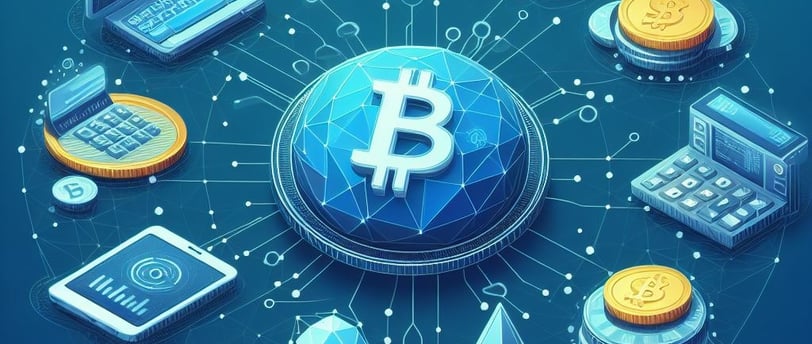Unlocking the Future of Finance: Exploring the Potential of Decentralized Finance (DeFi)


In recent years, a new and disruptive force has emerged in the world of finance - Decentralized Finance, or DeFi. This innovative concept is challenging traditional financial systems by offering more accessible, efficient, and transparent financial services. In this article, we will delve into the potential of DeFi, the opportunities it presents for investors, and how it could transform banking, lending, and investing.
The Rise of Decentralized Finance
Decentralized Finance, also known as DeFi, refers to a system that aims to recreate traditional financial services using blockchain technology. Unlike traditional finance, which relies on intermediaries such as banks and financial institutions, DeFi operates on decentralized networks. This allows for greater accessibility, transparency, and efficiency.
One of the key features of DeFi is the use of smart contracts. These self-executing contracts are coded on the blockchain and automatically execute transactions when certain conditions are met. This eliminates the need for intermediaries and reduces the associated costs and delays.
Opportunities for Investors
DeFi presents a range of opportunities for investors who are willing to embrace this new financial paradigm. One of the most significant opportunities is the ability to participate in decentralized lending and borrowing platforms. These platforms allow individuals to lend or borrow digital assets without the need for a traditional financial institution.
By participating in decentralized lending, investors can earn interest on their holdings by lending them to borrowers. This opens up a new avenue for generating passive income in the crypto space. Additionally, borrowers can access capital without going through the traditional loan application process, making it more inclusive and accessible.
Another opportunity in DeFi is decentralized exchanges. These platforms allow users to trade digital assets directly with each other, without the need for a centralized exchange. This eliminates the risk of hacks or manipulation that can occur on centralized exchanges. It also provides users with greater control over their assets and reduces the reliance on intermediaries.
The Transformation of Banking, Lending, and Investing
Decentralized Finance has the potential to transform traditional banking, lending, and investing in several ways. Firstly, it can provide financial services to the unbanked and underbanked populations around the world. By leveraging blockchain technology, DeFi can offer financial services to individuals who do not have access to traditional banking systems.
Furthermore, DeFi can streamline the lending process by removing the need for intermediaries. This can reduce costs, increase efficiency, and make lending more accessible to a wider range of individuals and businesses. Smart contracts can automate the lending process, eliminating the need for lengthy paperwork and approval processes.
When it comes to investing, DeFi opens up new opportunities for individuals to diversify their portfolios. Traditional financial markets are often limited to certain geographic regions or asset classes. With DeFi, investors can access a wide range of digital assets and investment opportunities from anywhere in the world.
The Technologies Driving DeFi
Several key technologies are driving the growth of DeFi. One of the most important is blockchain technology, which provides the foundation for decentralized networks and smart contracts. Blockchain ensures transparency, immutability, and security, making it ideal for financial applications.
Ethereum, the second-largest cryptocurrency by market capitalization, has played a significant role in the development of DeFi. Its programmable blockchain has enabled the creation of decentralized applications (DApps) and smart contracts, which form the backbone of many DeFi platforms.
Other technologies such as decentralized oracles, which provide external data to smart contracts, and stablecoins, which aim to maintain a stable value, are also crucial for the functioning of DeFi platforms.
The Risks of DeFi
While DeFi offers exciting opportunities, it is not without its risks. One of the main risks is the potential for smart contract vulnerabilities. If a smart contract is not properly audited or contains a bug, it can lead to financial losses for users. This highlights the importance of thorough security audits and due diligence when participating in DeFi platforms.
Another risk is the volatility of digital assets. Cryptocurrencies can experience significant price fluctuations, which can impact the value of investments in DeFi platforms. It is important for investors to carefully consider their risk tolerance and diversify their portfolios to mitigate these risks.
The Long-Term Implications for the Global Financial Ecosystem
The rise of DeFi has the potential to disrupt the global financial ecosystem in profound ways. It challenges the traditional intermediaries and centralized systems that have long dominated the financial industry. By offering more accessible, efficient, and transparent financial services, DeFi has the potential to democratize finance and empower individuals around the world.
However, the widespread adoption of DeFi will require regulatory clarity and infrastructure development. Governments and regulatory bodies are still grappling with how to regulate and supervise this new financial paradigm. Additionally, scalability and user experience improvements are needed to make DeFi more user-friendly and accessible to a wider audience.
In conclusion, Decentralized Finance (DeFi) is unlocking the future of finance by offering more accessible, efficient, and transparent financial services. It presents exciting opportunities for investors, with decentralized lending and borrowing platforms and decentralized exchanges. DeFi has the potential to transform banking, lending, and investing by providing financial services to the unbanked, streamlining the lending process, and expanding investment opportunities. However, it is not without risks, and careful consideration and due diligence are necessary when participating in DeFi platforms. As DeFi continues to evolve, its long-term implications for the global financial ecosystem are yet to be fully realized.
